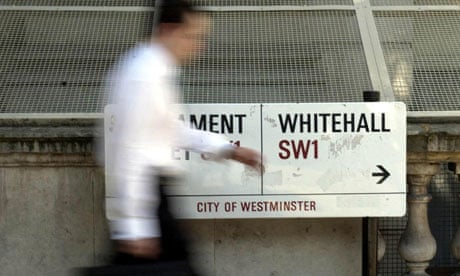What is the difference between an Athens bus driver and the chairman of the British Medical Association? The answer is not much. Just now they are both threatening to do unpleasant things to other people in defence of their wallets. They do not put it that way, of course, but we can call a spade a spade. No one is so determinedly employed as when seeking to make money.
A former lord chancellor, Lord Havers, said he only once voted against his party. It was on a matter so serious, so immoral, so damaging to the national interest that he had "no option". That matter was the attempt by the Thatcher government to end the barristers' monopoly in the high court. As a barrister he shuddered at this thin end of so awful a wedge. Government scandals, injustices and incompetences might come and go without his lordship batting an eye, but a reform that might sully the fees of the bar was a moral issue. He fought, and was successful.
We all owe loyalty to our profession, and all professions are conspiracies against the laity. But at a time of cuts George Bernard Shaw's maxim takes on a peculiar ferocity. This week Liam Fox displayed a rare fit of ministerial pique and banned the service chiefs from the inner sanctum of defence priorities. Generals, admirals and air vice-marshals – party to the biggest fraud on the taxpayer of modern times (the defence budget) – have been excluded from the new defence board. They bragged they could pacify Helmand and topple Gaddafi. Now at last Fox has called their bluff. To him and his colleagues the defence chiefs are an expensive bunch of professional chancers.
Other professions are also on the warpath, with more success. NHS consultants have fought off the threat of competition loosening their grip on hospitals, notably through private specialist clinics. "Protecting the NHS" is their code for protecting pay. General practitioners are "considering strike action" in defence of their final salary pensions [see footnote]. On Thursday teachers are striking in the same cause, with headteachers threatening to join them in the autumn. None of this has to do with the public interest, only with money, public money.
Nor have the lawyers been idle. They are resisting cuts in the soaring £2bn legal aid budget by leaking weekly stories of the damage it will do to the poor – with no mention of their fees. Since many ministers are themselves lawyers, they are reluctant to demur. Last week the lawyers also had to fight a flanking action in defence of their theatre of vanities, the jury system, after the abuses exposed by the Milly Dowler case. Abolition of all or most juries has long been attempted by Whitehall. But lawyers get away with claiming that this nice little earner, surviving hardly anywhere in Europe, is a pillar of the constitution.
The government has been struggling for years to get to grips with this professional log-rolling. White-collar militancy has been retreating in face of a quango cull. But with the great professions it has largely failed. They can brandish expertise, jargon and professional terrorism. When a medical officer tells a minister he must spend £5bn on BSE or £1bn on Tamiflu, the minister feels he must take him at his word. When the science lobby demands "the nation's science base" be excluded from the academic squeeze on universities, ministers capitulate. When an accountant advises the employment of a consultant "to cover for risk", it takes a bold man to object.
Ministers used to have a membrane protecting them from dud or costly professional advice. It was called the higher civil service, composed of practised sceptics who knew where most skeletons were hidden and could spot a corporate racket at a hundred paces. Prime ministers used to refer to this Whitehall machine as a "purring Rolls-Royce" that always responded to the wheel. That was largely because, as ridiculed in Yes Minister, politicians did more or less what they were told – only to find that eventually the car rolled downhill.
The senior civil service is one profession that has not prospered since the 1980s, victim first of Margaret Thatcher's "not one of us" policy and then Tony Blair's "sofa government". It was overwhelmed by political advisers and outside consultants, and all it could do was fight. Blair complained of "the scars on my back" of failing to get the machine to answer to his touch. Senior officials, pummelled by micro-management – witness constant political meddling with the NHS – came and went from outside. An elite born of Gladstone's reforms in the 19th century became the butt of satire and accusations of reactionary hostility. Officials no longer spoke truth to power, they just guarded their backs.
David Cameron came to office on a cloud of goodwill. Officials busied themselves with the coalition agreement. The cuts programme was clearly set out and given strong political leadership. "At long last, I get up in the morning knowing exactly what I have to do," reported one senior civil servant.
Yet within a year we have ministers describing civil servants as "the enemy". All the pre-election bombast about doing away with special advisers and quangos has gone quiet. The number of advisers has reportedly doubled in a year. Faced with the pressures of government, an inexperienced ministerial team has done the usual: hired its own people, and demoted and demoralised the civil service.
Ministerial anger at being bamboozled by cocky generals and self-interested scientists is one thing. Finding a way of getting the government machine to work to purpose is another. In any organisation there are virtues in a corps of senior officials with security of tenure, the wisdom of experience and a nose for politics distinct from a professional politician's snout. These virtues have been discounted for three decades.
Whitehall is no longer a partnership between ministers and officials, coming together to address a common problem. The defining mode of government is now a matter of bright but naive political initiatives followed by humiliating U-turns and a mess. This isn't the result of poor policy formation, but a decay of process. In winning the ear of power, soldiers, scientists, doctors and lawyers have become too strong, and civil servants not strong enough. As Betjeman wrote on the demise of a golf club official: "It's strange that those we miss the most / Are those we took for granted."

